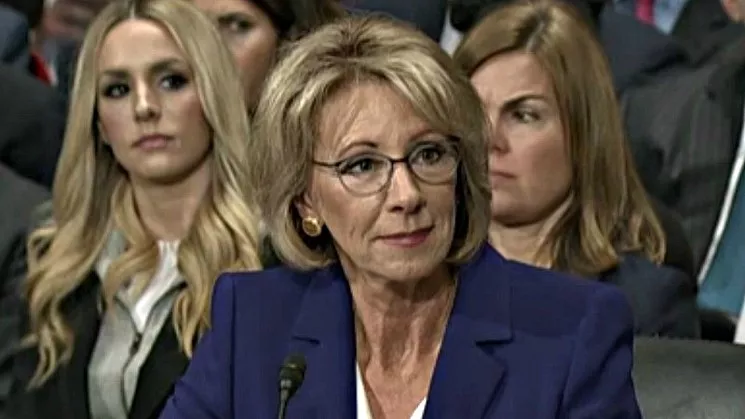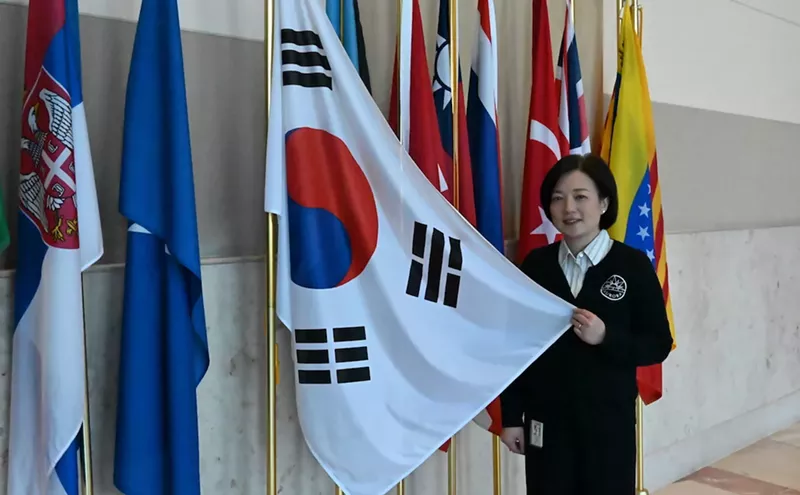Days after the end of a public-comment period about proposed changes in how sexual-misconduct accusations are handled on college campuses, the Department of Education, headed by the controversial Betsy DeVos, has announced that it is retracting two Obama-era documents that provided guidance in this area. A University of Colorado Denver expert in the field tells us this development won't immediately alter how schools deal with such matters, but it suggests that the future could bring policy changes that will be sweeping and potentially problematic.
"Interestingly, not a lot is required to change just yet," notes Sarah J. Berg, Deputy Title IX Coordinator of Prevention, Training and Outreach for CU Denver and the Anschutz Medical Campus, corresponding via email. "But this does give us a lot more information about where upcoming guidance is expected to go."
The new missive, accessible below, is credited to Candice Jackson, the Department of Education's acting assistant secretary for civil rights. Released on Friday, September 22, it reveals that the DOE is "withdrawing" the so-called "Dear Colleague" letter of 2011 that we mentioned in our previous coverage, as well as a Q&A about campus sexual misconduct issued in 2014.
Jackson justifies these actions like so: "The 2011 and 2014 guidance documents may have been well-intentioned, but those documents have led to the deprivation of rights for many students — both accused students denied fair process and victims denied an adequate resolution of their complaints. The guidance has not succeeded in providing clarity for educational institutions or in leading institutions to guarantee educational opportunities on the equal basis that Title IX requires. Instead, schools face a confusing and counterproductive set of regulatory mandates, and the objective of regulatory compliance has displaced Title IX’s goal of educational equity."
Whether the latest action has improved the situation is debatable, however.
"I would argue that this interim guidance is even more confusing and counterproductive than the systems we had previously in place," Berg allows. "This interim guidance gives schools the ability to design wildly different policies under which the same report with the same evidence would result in a different finding at a different school. This compromises the integrity of Title IX implementation across our country and is upsetting for anyone involved in a Title IX process, whether a reporting party, responding party, their loved ones or those of us attempting to do this work ethically despite an onslaught of misinformed changes."
At the same time, Berg acknowledges, "There are just a few things that are truly changing at this point." Moreover, she adds, "Some of these 'changes' aren't really changes at all."
As an example, she counters the implication in a 2017 Department of Education Q&A on sexual misconduct that policies are biased toward alleged victims: "In fairly assessing the need for a party to receive interim measures, a school may not rely on fixed rules or operating assumptions that favor one party over another, nor may a school make such measures available only to one party."
According to Berg, the idea that "schools previously only offered support during an investigation to the reporting party...is not true. Any school properly following previous guidance — and I can speak for all of the Denver area schools currently — offer equitable support for all parties involved in an investigation. This is an inherent part of a fair process, and I can speak for my colleagues when I say we all believe in this strongly and have long before [the new letter's] guidance."
She also believes that "similar to DeVos’s speech earlier this month, this guidance also contradicts itself quite a bit," as well as allowing "schools to choose to change their standard of evidence from preponderance of the evidence (what is used in civil court) to clear and convincing."
The bottom line for Berg as of today: "The removal of the earlier guidance doesn’t mean our policies can and will change for now — but they may have to if/when future guidance demands it."
Click to read the latest Department of Education letter, the 2011 "Dear Colleague" letter and the 2017 Q&A about campus sexual misconduct.

Audio By Carbonatix
[
{
"name": "GPT - Billboard - Slot Inline - Content - Labeled - No Desktop",
"component": "23668565",
"insertPoint": "2",
"requiredCountToDisplay": "2"
},{
"name": "STN Player - Float - Mobile Only ",
"component": "23853568",
"insertPoint": "2",
"requiredCountToDisplay": "2"
},{
"name": "Editor Picks",
"component": "17242653",
"insertPoint": "4",
"requiredCountToDisplay": "1"
},{
"name": "Inline Links",
"component": "18838239",
"insertPoint": "8th",
"startingPoint": 8,
"requiredCountToDisplay": "7",
"maxInsertions": 25
},{
"name": "GPT - 2x Rectangles Desktop, Tower on Mobile - Labeled",
"component": "24956856",
"insertPoint": "8th",
"startingPoint": 8,
"requiredCountToDisplay": "7",
"maxInsertions": 25
},{
"name": "Inline Links",
"component": "18838239",
"insertPoint": "8th",
"startingPoint": 12,
"requiredCountToDisplay": "11",
"maxInsertions": 25
},{
"name": "GPT - Leaderboard to Tower - Slot Auto-select - Labeled",
"component": "17676724",
"insertPoint": "8th",
"startingPoint": 12,
"requiredCountToDisplay": "11",
"maxInsertions": 25
}
]













